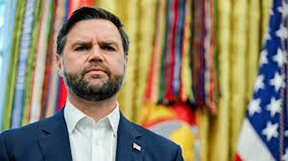Part Three: When Billionaires and Politicians Cozy Up: The Vance – Thiel Entanglement
By Sensible Sue
Alright, friends — lace up your sensible shoes because we’re strolling into a field that’s been plowed, planted, and harvested by venture capital, political ambition, and some very high-powered alliances. And at the center of it sits a pairing that should make every farmer, every rural community, and every American paying attention to land ownership perk up: J.D. Vance and Peter Thiel.
Let’s start with the basic facts before the social-media rumor mill spins them into compost. Yes, J.D. Vance has a small reported venture investment in AcreTrader. Emphasis on small. This isn’t a man quietly buying half the Midwest from behind a curtain. It’s a routine tech-world check, roughly the cost of a modest pickup, slipped in through his venture capital fund. The far more telling part of the story is that Vance’s political rise didn’t happen in a vacuum. It was bankrolled, mentored, and heavily amplified by Peter Thiel, the tech billionaire who hired Vance, funded him, and strategically nudged him toward national political prominence. That’s the relationship worth examining.
AcreTrader itself is not some quaint farm-lover’s app. It’s a financial platform designed to turn farmland into an investable product, bundling fields into LLCs and inviting accredited investors to buy slices of land the way you’d buy slices of a stock. Farmers still work the land, but many of them work it as tenants, not owners. The early capital behind AcreTrader came from venture-style investors; including Walton-family-backed firms , and by 2025 the company had been fully acquired by Proterra Investment Partners, an asset manager with vast resources and global ambitions. In other words, AcreTrader is no longer a startup; it’s a cog in a much larger institutional machine.
This is where the Vance–Thiel connection becomes more than a trivia point. When a politician’s rise to power is fueled by a billionaire investor’s patronage, it isn’t hard to see how policy priorities might start to tilt toward the interests of people with the deepest pockets. Peter Thiel didn’t just cheer from the sidelines; he poured money and influence into Vance’s political climb. And in politics, donors rarely invest without expectation. They expect influence, access, and a landscape; political and literal, that benefits their worldview and their portfolios.
That dynamic matters because capital doesn’t just follow markets; it shapes them. Investors like Thiel and firms like Proterra don’t pour money into farmland because they’re passionate about soil health or crop rotation. They do it because farmland is a stable, lucrative asset. When political power aligns with financial power, the regulatory environment often quietly shifts to make large-scale acquisition easier, more profitable, and less accountable to the communities who actually live on and work the land. This is not conspiracy, it’s the documented history of modern asset consolidation.
Meanwhile, farmers on the ground see something very different from the slick promotional language of democratized investing. What they see are families being outbid by investment groups with deep pockets. They see generational land transitioning into corporate portfolios. They see cash-rent leases replacing ownership, wealth leaving their communities, and long-term land decisions being made in urban boardrooms rather than at local kitchen tables. Trust erodes quickly when the checks are signed by people who have never set foot in the county, let alone the field.
The public conversation often gets hijacked by loud, flashy claims; foreign investors hiding behind shell companies or South African businessmen secretly snapping up cornfields. But the real threat isn’t hiding overseas. It’s right here at home in the marriage of big capital, political access, and economic policy. That’s the axis with the power to reshape land ownership in this country, and it does so without ever needing a viral conspiracy theory to help it along.
The fight for America’s farmland isn’t about debunked rumors or sensational memes. It’s about whether we allow the land that feeds us to become just another speculative product controlled by people whose interests are financial, not agricultural. It’s about whether communities get a fair shot at keeping their land, or whether every auction ends with a family farmer outbid by a fund manager armed with algorithms and a limitless line of credit. It’s about transparency, accountability, and the courage to question alliances that operate quietly but have enormous public consequences.
So let’s be clear: J.D. Vance’s little AcreTrader investment is not the actual danger. The danger is the power structure behind him, the one shaped by Peter Thiel’s money, influence, and access. This is the structure that can tilt policies on land, taxes, subsidies, antitrust enforcement, and foreign investment in ways that benefit the wealthiest stakeholders while squeezing everyone else.
So, here’s my final word?. Check the amounts if you want, but check the alliances more. The future of American farmland won’t be decided by one man’s $65,000 investment. It will be decided by the quiet, strategic partnerships between billionaires and politicians. And if the rest of us aren’t paying attention, the land we depend on will be owned, controlled, and governed by people who measure fields not in acres, but in yield curves and quarterly returns.

